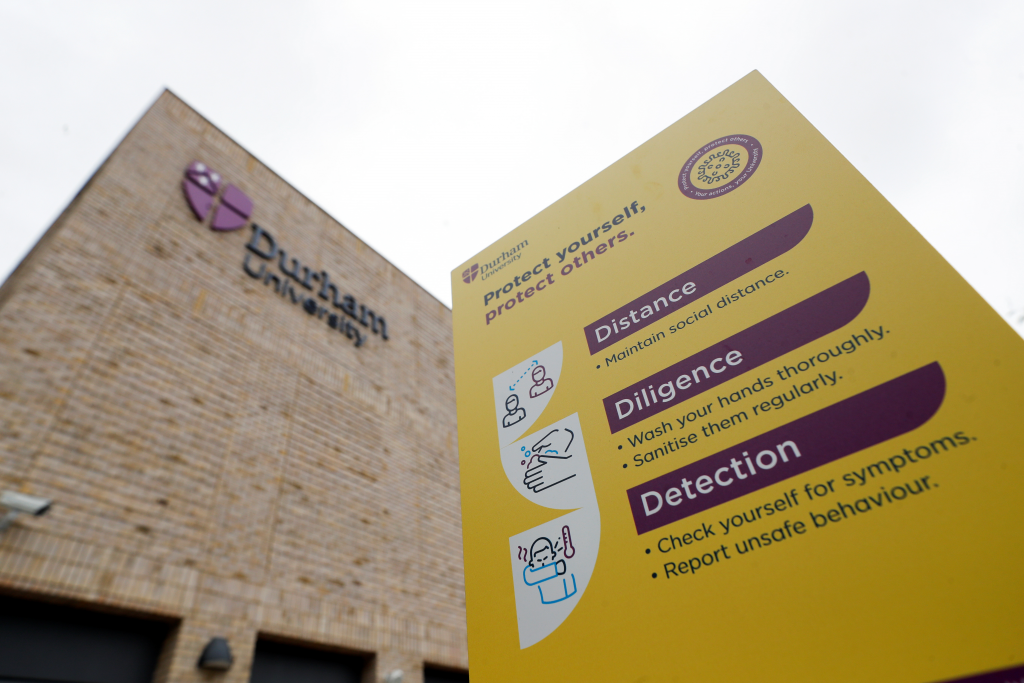Curated by the Knowledge Team of ICS Career GPS
Education

Image: REUTERS/Lee Smith
Is this what higher education will look like in 5 years?
Excerpts from article by Kate Whiting, published in World Economic Forum
- Ipsos surveyed adults in 29 countries on how they see higher education being delivered in five years’ time.
- The majority think the split between online and in-person learning that’s come about during the COVID-19 pandemic is here to stay.
- Respondents in China and Japan were most likely to see higher education being delivered mainly in person.
- Just over half of the adults surveyed believe in-person learning is worth its cost.
In 2025, higher education will be a hybrid of in-person and online learning, according to a new Ipsos survey for the World Economic Forum.
The pandemic saw as many as 1.3 billion learners affected this year, as schools and universities were forced to close, and adopt ‘blended’ learning strategies, which mixes online with face-to-face teaching.
Moving online
One in four adults surveyed (23%) believe higher education will move mostly online, while around half (49%) think it will be split between in-person and online. Only 29% think it will be delivered only or mostly in-person.
Nearly half of respondents in China (48%) and Japan (47%), which have had relatively low numbers of COVID-19 cases, think traditional in-person teaching will still be in place.
But only a third of adults in India (31%), where cases have been the second highest in the world, and less than a fifth of adults in Brazil (18%), third highest for cases, agree higher education will be face-to-face.
Counting the cost
The survey also found divergent views about the cost of in-person higher education.
On average, across the 29 countries, just over half (53%) agree that in-person higher education is worth its cost, compared to just over a third (36%) who disagree.
China (81%), Sweden (78%), Saudi Arabia (69%), India (68%), the Netherlands (64%), Malaysia (63%), Singapore (62%), and Germany (61%) were most in agreement.
While in Chile (59%), Italy (57%), Russia (51%), Brazil (51%), and South Korea (51%), more than half of adults surveyed think in-person higher education is not worth its cost.
Globally, men, adults aged 50-74 (55%) and, most of all, those with a university degree (59%) are especially likely to agree that in-person higher education in their country is worth the cost.
Career

Making A Post-Covid Career Change? How To Get Your Priorities Right
Excerpts from article by Anita Sands, published in Forbes
Living and working through a pandemic has muddied the waters for professionals everywhere. Industries are being upended, layoffs are plentiful, and people are questioning the career rules they’ve always played by.
I’ve been making twists and turns in my professional life for more than 20 years, and I’ve picked up a few tidbits of inspiration along the way. One of the best pieces of advice came from Frank Slootman, CEO of Snowflake. When I was considering a transition from financial services to technology, and leaving NYC for the West Coast, I found myself paralyzed, sometimes by the options, other times by fear.
He suggested thinking about my next career in the order of “geography, industry, role.” Too often, he said, people think about it in the opposite order, getting wrapped up in the relative merits of a given employment opportunity without first being clear that the job was where they actually wanted to live and in their ideal industry.
It was good advice then, and even greater wisdom now. First, for many of us, Covid has made us rethink what we need from our location. Is it necessary to live in an expensive, urban area or near the “office?” Or is being close to family who can help with childcare a higher priority?
Further, Covid has given us the opportunity to prioritize geography in a way we’ve never been able to before. As businesses nationwide announce they’re not going back to the old office routine, and will instead offer some remote or hybrid work options to their employees, companies you may never have before considered, because of where they’re based, might now make the short list.
The industries on that short list might also look different than they have before, as we’re witnessing the alarming upending of entire industries. Making wise career choices in the post-Covid age must involve considering which industries offer not only security in the short term but also, within them, which organizations have the proven ability to go from “good to great” and not “good to gone.”
Which brings us to the “role” component. Slootman’s view was if you got the geography and industry correct, the exact position became far less consequential. As Facebook COO Sheryl Sandberg once said, “If you’re offered a seat on a rocket ship, don’t ask what seat. Just get on!”
Of course, there are other personal priorities each of us must consider. If the geography-industry-role formula doesn’t ring true for you, make your own set of parameters. But keep it brief. Slootman also reasoned that if you have ten priorities, you have none. Rather than trying to meet a laundry list of desired job criteria, pick out the most important two or three and park the rest.
This is not a time for being wishy-washy or indecisive. Over commit to your top criteria and be prepared to completely sacrifice other variables. Most importantly, be intellectually and emotionally honest with yourself. The only question that matters, though, is whether or not they fit into yours.
Above all, don’t fear change, even if you’re examining options dramatically different than those you’ve considered before. Times like this show the degree to which our fears are a mass-produced item: Yours is no different than anyone else’s. Often when fear knocks, doubt answers. When it comes to your post-Covid career though, let opportunity open the door.
(Disclaimer: The opinions expressed in the article mentioned above are those of the author(s). They do not purport to reflect the opinions or views of ICS Career GPS or its staff.)
Like this post? For more such helpful articles, click on the button below and subscribe FREE to our blog.




